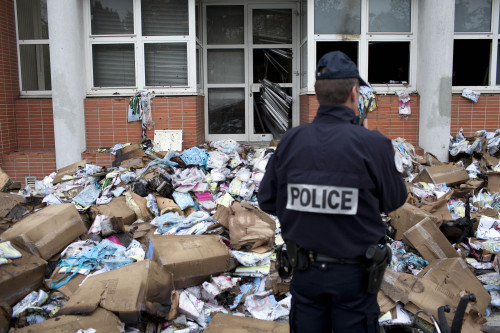 |
A police officer stands in front of the Charlie Hebdo headquarters in Paris on Wednesday. (AP-Yonhap News) |
PARIS (AP) ― A firebombing that destroyed the offices of a French satirical weekly that “invited” the Prophet Muhammad as its guest editor was denounced Wednesday by Muslim leaders and politicians from all sides.
But behind the public show of unity was a silent fear that the spoof could trigger a wave of violent protests among western Europe’s largest Muslim population, and beyond.
No one was injured in the blaze that started around 1 a.m. in the offices of Charlie Hebdo in eastern Paris, hours before the issue featuring a caricature of Muhammad on its front page hit the newsstands.
“Everything will be done to find those behind this attack,” said Interior Minister Claude Gueant, visiting the newspapers burned and disheveled offices.
The director of the weekly, who goes by the name Charb, called the issue “a joke” and defiantly held up a copy of the paper as he stood amid the rubble. He vowed that next week’s issue would be published.
“We’ll do it with pencils and paper,” said one writer, Patrick Pelloux, on the i-Tele TV station.
The latest issue of Charlie Hebdo, with its typically cutting humor, was focused on last week’s victory of a once-banned Islamist party in Tunisia’s first free elections and last month decision by Libya’s new leaders that Sharia, or Islamic legislation, will be the main source of law in post-Gadhafi Libya.
A police official cited a witness saying that someone was seen throwing two firebombs at the building. The official was not authorized to speak publicly while an investigation was in progress.
Charb, the director, said a Molotov cocktail lobbed into the offices caused the fire. He blamed “radical stupid people who don’t know what Islam is,” for the attack.
“I think that they are themselves unbelievers ... idiots who betray their own religion,” Charb said in an interview with Associated Press Television News.
The front-page of the weekly, subtitled “Sharia Hebdo,” a reference to Islamic law, showed a cartoon-like man with a turban, white robe and beard smiling broadly and saying, in an accompanying bubble, “100 lashes if you don’t die laughing.”
Previous depictions of the prophet have caused major disturbances in Muslim countries. Islamic law generally opposes any depiction of the prophet, even favorable, for fear it could lead to idolatry.
Images of the wave of protests, some deadly, that swept the world after the Danish newspaper Jyllands-Posten published a dozen newspaper cartoons of the Prophet Muhammad in 2005, notably one depicting the prophet with a bomb-shaped turban with a lit fuse, were doubtless not far from the minds of French authorities.
An estimated 5 million Muslims live in France and Muslim leaders constantly press officials to better fight Islamophobia ― and to refrain from feeding anti-Muslim sentiment with policies aimed at bolstering the French identity. A law banning burqa-like veils that hide women’s faces went into force in April.
The party of conservative President Nicolas Sarkozy has worked steadily to embrace the deep right wing ahead of presidential elections next spring, hoping to capture extreme-right voters and their anti-Islam message.
France’s Prime Minister Francois Fillon called on officials to move quickly to find those responsible and bring them to justice.
“Freedom of expression is an inalienable value of our democracy ... No cause can justify a violent action,” Fillon said in a statement. A handful of ministers and leaders on the rival left echoed similar indignation.
The president of an umbrella group representing France’s Muslims condemned the attack, as did the rector of the Paris mosque.
Mohammed Moussaoui, head of the French Council for the Muslim Faith, said his organization also deplores “the very mocking tone of the paper toward Islam and its prophet but reaffirms with force its total opposition to all acts and all forms of violence.”
Dalil Boubakeur, who heads the Great Mosque of Paris, condemned “an act which can in no way represent the principles of liberty, tolerance and peace that are (our) message.” But he regretted the “anxious European climate of Islamophobia” fed in part by stigmatizing Muslims through caricatures.
Charlie Hebdo caused a stir among Muslims in the past after it reproduced the Danish cartoons and created its own. The weekly was acquitted in 2008 by a Paris appeals court of “publicly abusing a group of people because of their religion” following a complaint by Muslim associations.
This time, the paper’s entire issue was meant to be a send-up on Islamic law, the director said.
“It was a joke where the topic was to imagine a world where Sharia would be applied,” Charb told APTN. “But since everyone tells us not to worry about Libya or Tunisia, we wanted to explain what would be a soft version of Sharia, a Sharia applied in a soft manner.”








